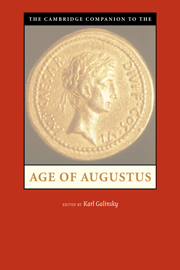Book contents
- Frontmatter
- Introduction
- Part I Political History
- 1 Augustus and the Power of Tradition
- 2 Augustus and the Making of the Principate
- Part II Intellectual and Social Developments
- Part III The Emperor's Impact
- Part IV Art and the City
- Part V Augustan Literature
- Part VI Epilogue as Prologue
- Select Bibliography and Works Cited
- Index
1 - Augustus and the Power of Tradition
from Part I - Political History
Published online by Cambridge University Press: 28 March 2007
- Frontmatter
- Introduction
- Part I Political History
- 1 Augustus and the Power of Tradition
- 2 Augustus and the Making of the Principate
- Part II Intellectual and Social Developments
- Part III The Emperor's Impact
- Part IV Art and the City
- Part V Augustan Literature
- Part VI Epilogue as Prologue
- Select Bibliography and Works Cited
- Index
Summary
Republican or Monarch?
When Augustus on his deathbed pointedly asked whether he had played the “farce of life” (mimum vitae; Suet., Aug. 99) well and asked for applause, he did not say what role he had in mind. Was it that of world ruler and imperator, who more than any Roman before him had enlarged and secured the boundaries of the Roman empire? Or did he want to be applauded as “prince of peace,” who after the turmoil of protracted civil wars brought the Romans the calm of the Pax Augusta? Did he think of his efforts on behalf of morality and religion or of his reputation as “Father of his Country” (pater patriae) and his unceasing care for peace, liberty, and prosperity of his “children”? But there was one thing he surely did not mean: the role of a monarch.
True, he had never restricted himself to the role of “Grey Eminence,” content with operating in the background. Rather, he always sought recognition for his accomplishments and assiduously saw to raising his and his family's profile in both Rome and the provinces through the media of architecture, literature, and art. At the same time, he had also renounced all insignia of personal power: no scepter, no diadem, nor the golden crown and purple toga of his adoptive father. He knew well that as son of the deified Caesar and as Augustus (”The Revered One”) he was endowed with a special aura and that his military, political, and financial resources elevated him beyond the reach of his fellow citizens.
- Type
- Chapter
- Information
- The Cambridge Companion to the Age of Augustus , pp. 13 - 32Publisher: Cambridge University PressPrint publication year: 2005
- 13
- Cited by

